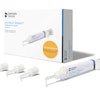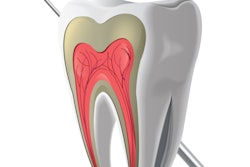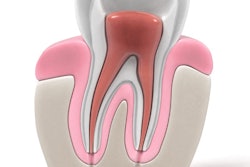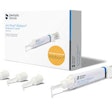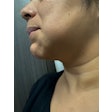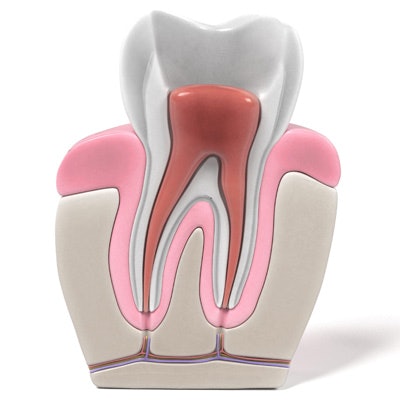
A commercially available obturation material may better at preventing vertical root fractures than gutta-percha, according to a new systematic review that looked at vertical root fracture incidence in more than 650 roots.
The review found that roots obturated with Resilon (Resilon Research) were significantly less likely to experience a vertical root fracture than those sealed with gutta-percha. The results were published in BMC Oral Health (June 13, 2018).
"A meta-analysis was performed to evaluate and compare the reinforcement efficacy of these two obturation systems on endodontically treated root canals," wrote the authors, led by Minmin Tan and Dr. Zhaowu Chai. "The results can offer guidance to clinicians in evidence-based decision making."
Tan and Dr. Chai are from the Chongqing Medical University College of Stomatology and the Chongqing Municipal Key Laboratory of Oral Biomedical Engineering of Higher Education in China. Tan is a postgraduate student, and Dr. Chai is a lecturer.
Finding the best material
Vertical root fracture is a common and serious complication of root canal therapy that can result in treatment failure and tooth extraction. Therefore, clinicians are eager to prevent these fractures and strengthen endodontically treated roots, such as by using gutta-percha or Resilon to obturate canals.
“The results can offer guidance to clinicians in evidence-based decision making.”
While a number of individual trials have studied these two materials, there are limited systematic reviews on the topic, according to the authors. Therefore, they used data from 14 randomized clinical trials to see whether gutta-percha (AH Plus, Dentsply Sirona) or Resilon was better for obturating root canals after endodontic therapy.
All of the included trials compared gutta-percha and Resilon, either to each other or a control. Researchers also used a similar in vitro universal testing machine to simulate vertical forces.
The final review analysis included more than 650 roots. Unsurprisingly, virgin teeth were significantly stronger than teeth obturated with either material. However, teeth obturated with Resilon were significantly less likely to experience a vertical root fracture than teeth with unfilled root canal treatment, the researchers found.
The same was not true for teeth filled with gutta-percha/AH plus, which performed significantly worse than teeth with unfilled root canals and roots obturated with Resilon.
"Compared with gutta-percha, Resilon shows superior bonding potential when applied in combination with a resin-based sealer," the review authors wrote. "Therefore, the Resilon system has a superior ability to reinforce instrumented roots than does the gutta-percha/AH plus obturation system."
Clinical trials still needed
All of the included studies had low to medium risk of bias; however, several shortcomings still existed. Notably, all the studies included were in vitro studies, so the findings cannot be extrapolated to clinical situations, according to the review authors. Furthermore, they could not analyze publication bias because of the relatively small number of studies included in the review.
The authors suggested future studies continue to evaluate the best materials for preventing vertical root fractures following endodontic therapy. Specifically, they noted that well-designed randomized controlled clinical trials involving patients are a necessary next step.
"The present study suggests that filling the canals with gutta-percha/AH plus fails to reinforce endodontically treated root canals, whereas the Resilon obturation system can increase the [vertical root fracture] resistance of prepared roots," the authors wrote. "It is to be noted that the conclusion should be interpreted cautiously because this meta-analysis was based on in vitro studies."


